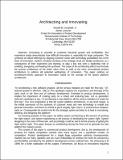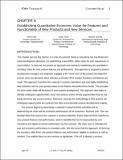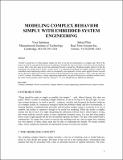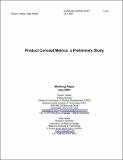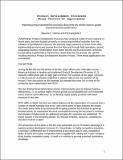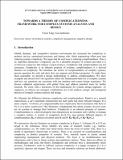Browsing Other CIPD Research by Title
Now showing items 1-12 of 12
-
Architecting and Innovating
(2004-04-14)Innovating is essential to sustained industrial growth and profitability. But experience amply demonstrates how difficult innovation is, especially for large companies. The synthesis of valued offerings by aligning customer ... -
Competition, Innovation, and Product Exit
(2001-03-19)Why do products exit markets? This paper integrates rationale for product exit from a number of different literatures and compares the statistical and substantive effect of these explanations. We use a novel dataset ... -
Complex System Classification
(International Council On Systems Engineering (INCOSE), 2004-07-24)The use of terms such as “Engineering Systems”, “System of systems” and others have been coming into greater use over the past decade to denote systems of importance but with implied higher complexity than for the term ... -
Do Venture Capitalists Affect Commercialization Strategies at Start-ups?
(2000-06-16)I empirically study the effect of venture capital (VC) on product development and commercialization strategy of start-up organizations. In doing so, I segment entrant commercialization strategies into two camps according ... -
Establishing Quantitative Economic Value for Features and Functionality of New Products and New Services (CHAPTER N)
(PDMA Toolbook II, 2003-09-13)This chapter has two key themes: (1) a list of customer needs is interesting, but insufficient for many development decisions, (2) establishing a quantified, dollar value for each requirement is more helpful. To that end, ... -
Modeling Complex Behavior Simply with Embedded System Engineering
(2000)Newton’s second law as written appears simple, but how to use the law perceptually is a complex task. Most of the cases it is good for conceptual discussion or development. Normally the sign convention is not shown and ... -
Organizational Languages
(2003-11-11)The paper is concerned with communication within a team of players trying to coordinate in response to information dispersed among them. The problem is nontrivial because they cannot communicate all information instantaneously, ... -
Product Concept Metrics: a Preliminary Study Working Paper
(2001-07)Metrics for product concept evaluation and screening is a relatively unstudied topic of product development. Having a clearly documented set of metrics for concept screening decisions is a prerequisite for an educated and ... -
Product Development Processes, Three Vectors Of Improvement
(2003)Product Development Processes have achieved a state of some maturity in recent years, but have focused primarily on structuring technical activities from the initiation of development to launch. We advocate major advances ... -
Surviving the Gales of Creative Destruction: The Patterns of Innovative Activity in the Desktop Laser Printer Industry
(2000-07-14)In this paper, we examine the product life cycle in the desktop laser printer industry, from its inception in 1984 through 1996. During this time, the industry experienced a significant degree of innovation, as well as an ... -
Towards a Theory of Complicatedness: Framework for Complex Systems Analysis and Design
(2001-08)Global, dynamic, and competitive business environment has increased the complexity in product, service, operational processes and human side. Much engineering effort goes into reducing systems complexity. We argue that ... -
Transferring, Translating and Transforming: An Integrative Framework
(2002-03-10)Organizations must establish processes for managing knowledge across boundaries because of the specialized and task-dependent forms of knowledge required to deliver products and services. To address this challenge an ...

